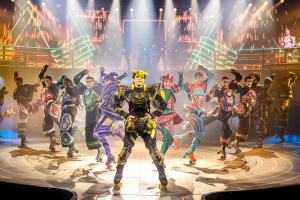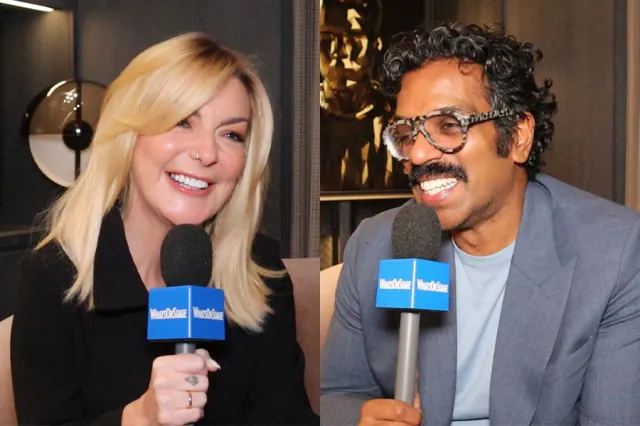Alexi Kaye Campbell: 'I was an actor for 20 years, so I understand what they need'
Actor-turned-playwright Alexi Kaye Campbell’s acclaimed new play Bracken Moor is currently at the Tricycle, while a star-laden revival of his breakthrough work The Pride is due next month

© Johan Persson
Could you give us a quick snapshot of Bracken Moor?
It's a gothic ghost story. It's quite difficult to talk about it without giving massive spoilers. I think it takes you on lots of twists and turns and I hope that the fun of it is never knowing where it's going to take you next. It's set in 1937 – I chose that period because I believe there are some parallels between then and now. Hopefully by the end of the play the choice of form will make sense, because in some way I think it reflects the content.
Do you think Europe is currently anywhere near the kind of danger it faced in the 1930s?
Maybe I feel it more acutely because I'm half Greek. My family live in Greece, so I go to Greece a lot, and the situation there has been quite extreme; I just did a short play at the Royal Court about it. Ten years ago if you'd have asked me if I thought the far right would have any sway or power in Greece I would have laughed at the notion, but now Golden Dawn is garnering support from about 10% of the population. So I do think there is a great worry. I'm not much of a doom-monger as I think there's always hope. But I also believe, with the situation being as it is, that big questions have to be asked about the current system and the fact that it's not really working for most people.

The play also addresses tensions between the working and upper class
It's not possible to ask questions about the economic system without asking questions about class, is it? And that applies as much to today as to any period before. We're living in a time of great economic inequalities and growing unemployment, Again, perhaps I feel it more acutely because I'm influenced by what I see happening in Greece, where there has been a gradual but overwhelming erosion of the middle class. So I wanted to address all these issues about class and social inequality but do so in an indirect and hopefully original way. That's why I chose the form of a ghost story.
A playwright recently told me that he finds the first production of a play is difficult, because it highlights the problems. Do you agree?
I'm very proud of what Polly Teale has achieved. I think it's a stunning production and beautifully acted. I wouldn't change anything about the play right now , although of course, in the future, I'll probably change my mind.
Could you tell us a bit more about your involvement in the Open Court season [at the Royal Court]?
We came up with the idea of a week of plays called PIIGS, which is the acronym for Portugal, Italy, Ireland, Greece and Spain. The whole event was about the crisis affecting these Eurozone countries. We did an evening on each of them, and I worked on the Greek evening, translating a play by Andreas Flourakis from Greek and then writing my own short play as a response to his. It was a very immediate reaction to what's happening, and came out of the brilliant idea Vicky had for Open Court.
I've also been doing something called Playwright at Your Table, which is terrifying. There's a group of playwrights taking part including Simon Stephens, David Eldridge and Timberlake Wertenbaker. We put our names in a hat and then the audience pick a playwright and follow them to some part of the Royal Court where he or she reads one of their plays to them in its entirety. I was so concerned about boring them that and I ended up doing all these ridiculous voices, trying to animate the play as much as I could just to keep them interested. Whether I succeed or not is debatable.
Is it strange being at the Court without Dominic [Cooke, Campbell's partner]?
Not really, because I never worked directly with Dominic at the Court. I had two plays produced there when he was the AD, but I mainly collaborated with Jamie Lloyd. I think Vicky is hugely inspiring, and of course she's going to put her own mark on the place. Dominic did an extraordinary job at the theatre, and I'm incredibly proud of what he achieved there, but I'm sure Vicky will be equally bold in her choices. Part of the Court's excellence needs to be connected with taking risks, and Vicky is a risk-taker as much as Dominic is, in different ways. It's exciting.
How does playwriting compare to acting?
As an actor you're putting yourself in other people's shoes, and as a writer you're trying to do the same but with more characters. I used to write when I was younger and then I stopped for a long time and focussed on the acting. When it got to a point in my life when I was approaching 40 and wasn't fulfilled enough, I returned to the writing. But all my years as an actor have completely informed my work as a playwright. I was an actor for almost 20 years and I like to think that I learnt a lot from being in lots of different plays . And I think I understand something of what actors need. I try and give every actor in the plays I write his or her ‘moment' because I remember how frustrating it is for actors if they don't get a chance to shine a little, even if it is for one short scene.
So you're set on playwriting now?
I'm completely set on it, and I think I've got a few more plays in me.
Is there something to be said for starting a playwriting career later in life?
Absolutely. I think in some ways we live in a culture that's obsessed with youth, whatever field that's in. That attitude permeates every profession, and it certainly does the arts and theatre. But personally, I could not have written The Pride (2008) when I was 25. I just wasn't ready. For me the whole process of learning things and serving an apprenticeship as an actor first really informed my life as a writer. I probably couldn't have written anything when I was in my early 20s, though that's not to say there aren't plenty of brilliant writers who can.
Are you excited about revisiting The Pride with Jamie Lloyd?
Hugely. Jamie's original production was stunning but the play was seen by very few people as it had a short run in a small theatre. So to be bringing it back to a London audience is very gratifying. And what is especially exciting is that because it's been a good five years and we have a whole new cast Jamie will be revisiting the play from scratch, not just re-staging the original version.

Did the recent gay marriage debate prompt the revival?
The gay marriage debate has been in the news a great deal lately, so there is no question that suddenly the play seemed extremely topical. One of the main themes of The Pride is the question of commitment in its various forms. So that becomes even more relevant considering that a few hundred metres down the road from the theatre the Houses of Parliament have been debating the topic of gay marriage.
And you'll be working with Hayley Atwell again
I loved working with Hayley on The Faith Machine and I cannot wait to be in the rehearsal room with her again. The thing about Hayley is that apart from being a wonderful dramatic actor she has a great flair for comedy and The Pride will give her ample opportunity to exercise that gift. And apart from anything else, she is a gorgeous person: open, intelligent and generous.
And after The Pride, what's next?
I'm working on a couple of things, including a commission from the National which I said I'd deliver it at some point within the next six months. But that's under wraps at this stage, largely because I'm the kind of writer who will spend three months writing about a subject and then completely change direction. So if I say something now it'll probably be something entirely different by the end of the month. So best not to say anything at all.












